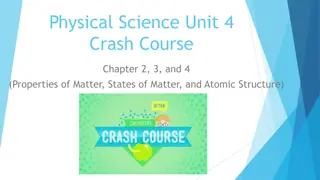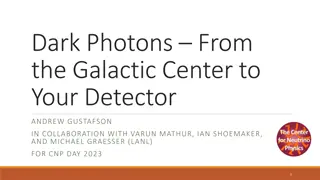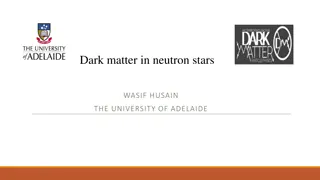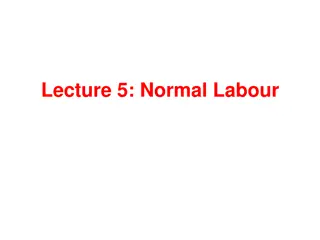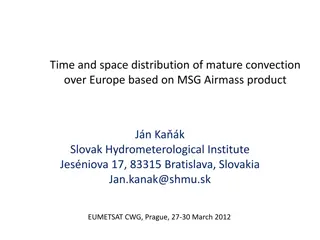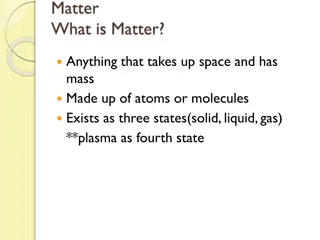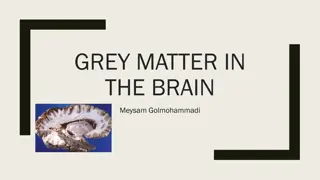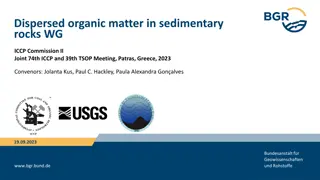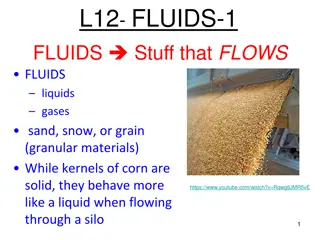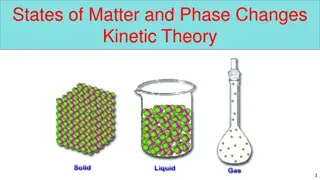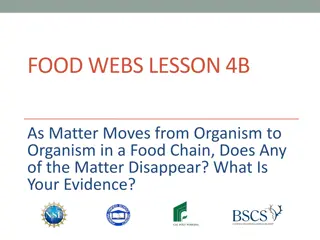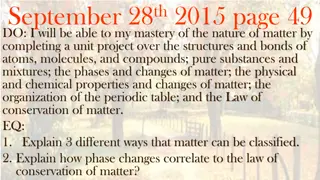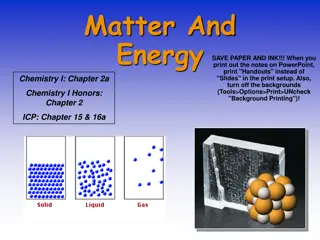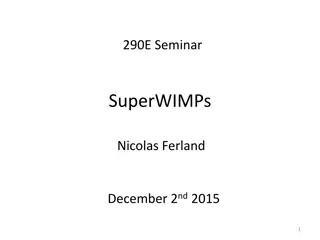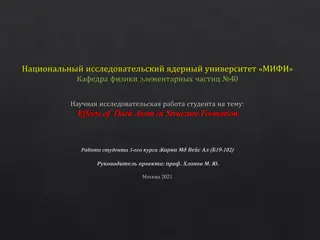Introduction to Chemistry: Matter, Energy, and Measurement
Chemistry is the study of matter, its properties, and the changes it undergoes. This content covers the basics of chemistry, including the classification of matter into pure substances and mixtures, different states of matter, and the building blocks of matter such as atoms and molecules. Sample exe
5 views • 51 slides
Understanding Properties and States of Matter in Physical Science
Matter is made up of elements that cannot be broken down further. Different mixtures have distinct properties, such as solutions, colloids, and suspensions. Physical properties like viscosity and density can be observed without changing the material's composition. Chemical properties, like flammabil
2 views • 15 slides
Understanding Subject Pronouns and Sentence Structure
Learn about the structure of a sentence, the use of subject pronouns to replace subject nouns, and how subject pronouns come before verbs with examples. Subject pronouns like "she," "he," "they," and "we" are essential in forming clear and concise sentences.
0 views • 5 slides
Understanding Matter in Our Surroundings
Matter in Our Surroundings discusses the classification of matter, physical nature of matter, and the properties of matter particles such as size, space between them, and continuous movement. It explains how matter is made up of particles and how they interact with each other through various activit
0 views • 27 slides
Understanding New Jersey Mature Driver Challenges
New Jersey has a significant population of mature drivers aged 65 and older, accounting for 21% of licensed drivers. The proportion of crashes involving mature drivers has increased, with over 17% occurring in 2020. Vision, hearing, cognition, and physical condition changes with aging impact driving
0 views • 51 slides
Understanding Subject Pronouns in English Sentences
Learn about the structure of a sentence and the role of subject pronouns in replacing subject nouns. Subject pronouns come before verbs and help to make sentences clear and concise. Examples provided demonstrate how subject pronouns are used effectively in various sentences.
0 views • 5 slides
Unveiling Dark Matter Mysteries Through Dark Photons
Delve into the exploration of dark matter through the lens of dark photons in the galactic center and detectors. Uncover the enigmatic nature of dark matter, its interactions, existing constraints, and our model with fermionic dark matter and a dark photon mediator. Discover strategies to evade cons
0 views • 18 slides
Exploring Neutralino Dark Matter Mass Limits
Hajime Fukuda, along with researchers Shirai and Luo, conducted a study on the maximum mass of Neutralino dark matter particles. They investigated coannihilation effects and how colored sparticles can enhance LSP annihilation. The study delves into the implications for TeV-scale supersymmetry models
0 views • 39 slides
Exploring Quarkyonic Matter and Chiral Pairing Phenomena
Investigate the characteristics of quarkyonic matter and chiral pairing phenomena in the context of dense QCD at T=0. Delve into the confinement aspects, the properties of quarkyonic matter near T=0, and the candidates for chiral symmetry breaking. Consider the implications of chiral pairing phenome
0 views • 42 slides
Exploring Dark Matter in Neutron Stars
Investigate the interaction of dark matter within neutron stars, comprising approximately 25% of the universe's total matter. The nature of dark matter assumptions, its distribution within neutron stars based on fermionic or bosonic properties, and the implications for self-interacting fermionic and
0 views • 22 slides
Understanding Matter and its Classification in Chemistry
Matter is defined as anything that occupies space and has mass. It can be classified into solids, liquids, and gases, as well as pure substances and mixtures based on their composition. This overview covers the states of matter, Aristotle's four elements theory, and the classification of matter into
0 views • 13 slides
Understanding Gametogenesis and Oogenesis Process in Humans
Gametogenesis is the formation of gametes from germ cells in the testes and ovaries, involving meiosis and cytodifferentiation. Oogenesis specifically refers to the differentiation of oogonia into mature oocytes, with prenatal oogenesis occurring before birth and postnatal oogenesis after birth. The
0 views • 17 slides
Understanding Normal Labour in Pregnancy
Labour is the natural process of expelling a mature foetus from the uterus. Criteria for normal labour include spontaneous expulsion of a single, mature foetus within a reasonable time frame without complications. Various theories explain the onset of labour, such as hormonal factors and mechanical
0 views • 35 slides
Understanding Mature Convection Distribution Over Europe
Analyzing the time and space distribution of mature convection over Europe based on MSG Airmass product from Slovak Hydrometeorological Institute. The data covers various timeframes and processing steps, highlighting the dependence on Sun elevation, daytime hours, and monthly variations. Statistical
0 views • 11 slides
Understanding MARC Subject Headings
Access points in MARC records provide information about what a resource is or what it is about. Commonly used subject headings include personal or family names, corporate body names, conference names, uniform titles, topical subject headings, geographic subject headings, genre or form subject headin
0 views • 21 slides
Searching for Dark Photon Dark Matter with Cosmic Ray Antideuterons
Exploring the use of cosmic ray antideuterons for dark matter detection is a promising avenue in astrophysics. Antideuteron searches offer a low-background environment, making them ideal for detecting certain types of dark matter particles. Unlike antiproton searches, which face significant backgrou
0 views • 30 slides
Understanding States of Matter and Kinetic Theory
Matter is anything that occupies space and has mass, existing in solid, liquid, gas, and plasma states. The states of matter depend on the arrangement and motion of atoms. Solids have fixed shapes, liquids take the shape of their container, and gases fill the volume of their container. The Kinetic T
0 views • 18 slides
Exploring the World of Matter and Elements
Matter is the physical "stuff" of the universe, encompassing elements that make up rocks, wood, air, metals, water, and living organisms. Chemical elements are the building blocks of matter, with essential elements like oxygen, carbon, hydrogen, and nitrogen constituting a significant part of living
0 views • 24 slides
Ministry of Labour, Immigration, Training, and Skills Development Apprenticeship Overview
Ministry of Labour, Immigration, Training, and Skills Development established Skilled Trades Ontario (STO) to simplify and transform the skilled trades and apprenticeship system in Ontario. The process involves three phases: STO transition, planning for a mature state, and implementation of a mature
0 views • 6 slides
Understanding Ohio Revised Code Chapter 3365: Managing Mature Subject Matter in Education
Ohio Revised Code Chapter 3365 introduces regulations regarding mature subject matter in education, requiring specific actions from colleges and secondary schools. It defines mature subject matter and outlines procedures for handling such content, including the development of permission slips and st
0 views • 21 slides
Nursing Management of High-Risk Newborns: Post-Mature Infant Focus
High-risk newborns, including post-mature infants, require specialized care due to their increased chances of morbidity. Identification, goals, assessment, nursing principles, and management strategies are crucial in providing effective care for these vulnerable neonates. Predisposing factors, clini
0 views • 17 slides
Navigating the Transition to University: Tips for Mature Students
Explore insights on transitioning from college to university as a mature student, including personal reflections, cultural and skills differences, survival tips, and future career prospects. Discover valuable advice on involving family and friends, being positive, seeking help, prioritizing life, an
0 views • 8 slides
Developing PE Subject Leadership Course Overview
This course aims to enhance subject leadership skills in Physical Education, focusing on leadership development, exploring the role of subject leaders, and improving outcomes for pupils. Participants will reflect on their leadership stage, revisit the core purpose of subject leadership, and develop
0 views • 49 slides
Exploring Matter and Physical/Chemical Changes in Science Class
Delve into the world of matter and its transformations through engaging activities such as classifying elements, compounds, and mixtures using nuts, bolts, and washers. Understand the concepts of mass, space, and the different types of matter through hands-on learning experiences in this interactive
0 views • 31 slides
Understanding Gray Matter in the Brain: Structure, Function, and Importance
Gray matter in the brain plays a crucial role in information processing and cognitive functions. Composed of neuronal cell bodies and unmyelinated axons, gray matter is visibly pinkish-gray and is essential for various brain functions. It forms a synaptically dense area with fewer cell bodies compar
0 views • 7 slides
Dispersed Organic Matter in Sedimentary Rocks - Review Paper for Geological Application Studies in the 21st Century
The WG on Dispersed Organic Matter in Sedimentary Rocks is working on a review paper focusing on application studies of dispersed organic matter (DOM) within a geological context. The paper aims to provide an insightful overview titled "Applications of Dispersed Organic Matter Petrology in the 21st
0 views • 18 slides
Understanding Matter: Solids, Liquids, Gases, and Fluids
Matter exists in various states - solid, liquid, gas, and fluid. Solids have atoms closely packed, liquids have more freedom but still cohesion, gases have atoms spread out, and fluids flow like liquids or gases. Mass density characterizes matter based on atom proximity. Gas pressure results from mo
0 views • 22 slides
Future Prospects in Dark Matter Research at Fermilab
Exploring new avenues in the realm of dark matter research, Fermilab stands at the forefront with potential upgrades to their detectors, such as the LZ and PICO-X. The presentation delves into the scientific criteria influencing the choice of detectors, the pursuit of understanding dark matter and d
0 views • 6 slides
Innovative Solutions for Mature Oil and Gas Fields Powered by Poseidon Technology
Poseidon, a leap energy technology platform, offers modules designed for complex, high well count mature oil and gas fields. Its LTRO workflow provides a cost-effective solution for identifying remaining oil in wells with long production histories and multiple zones. By using compliant mapping metho
0 views • 31 slides
Understanding Enamel: Structure, Formation, and Properties
Enamel is the hardest substance in the human body, formed by ameloblast cells during tooth development. Chemically, it consists mostly of inorganic matter, primarily hydroxyapatite. Mature enamel lacks organic matter, is avascular, and not renewed. Its structural unit is the enamel rod, surrounded b
0 views • 28 slides
Understanding Matter: States, Properties, and Changes
Matter is anything with mass and volume, existing in solid, liquid, or gas states. The Kinetic Molecular Theory explains the behavior of particles in matter. Chemistry explores matter through chemical and physical changes. Different factors, like temperature, can change the state of matter. Physical
0 views • 6 slides
Understanding Matter: Properties and Changes
Matter is anything that has mass and volume. This includes the concepts of mass, volume, chemical changes, temperature effects, particle model, kinetic molecular theory, and describing matter based on physical properties. Learn about different states of matter, such as solids, liquids, and gases, an
0 views • 9 slides
Understanding Kinetic Theory of Matter and Phases
Explore the fundamental concepts of the Kinetic Theory of Matter, including the three pillars of kinetic energy and forces of attraction, which determine the states of matter like solid, liquid, gas. Learn about temperature, phase changes, and the phases of matter, emphasizing the role of kinetic en
0 views • 17 slides
Exploring Food Chains: Does Matter Disappear Along the Way?
In this lesson on food chains, students investigate whether matter disappears as it moves from one organism to another. Using a linking-cube simulation, they track food molecules mathematically to determine if any matter is lost in the process. The lesson involves hands-on activities and observation
0 views • 30 slides
Exploring the Nature of Matter: Unit Project Overview
Embark on a journey to understand the structures and bonds of matter through a comprehensive unit project. Delve into atoms, molecules, compounds, pure substances, mixtures, phases of matter, properties, periodic table, and conservation laws. Explore matter classification and phase changes' relation
0 views • 9 slides
Introduction to Chemistry and Matter
Understanding chemistry involves studying the properties of matter and its changes. Matter is anything that occupies space and has mass, composed of vibrating atoms. It includes examples like air, water, books, desks, and people, while non-examples are light, sound, thoughts, and emotions. Physical
0 views • 18 slides
Understanding Matter and Energy in Chemistry: A Comprehensive Overview
Exploring the intricate nature of matter, this collection delves into the fundamentals of chemistry, from the macroscopic to the particulate level. Covering topics such as the states of matter, kinetic nature, physical properties, and other states of matter like plasma and Bose-Einstein condensate,
0 views • 18 slides
Exploring Matter and its Properties
Matter is the fundamental component of everything around us, existing in various forms such as solids, liquids, and gases. This article delves into the states of matter, chemical changes, physical changes, and the kinetic molecular theory, shedding light on the basic building blocks of life and the
0 views • 8 slides
Exploring the Mysteries of Dark Matter and SuperWIMPs
Dark matter, detected only gravitationally, poses enigmatic characteristics and poses challenges in direct detection. Scientists search for interactions with particles, explore hypothetical undetectable forms, and consider production mechanisms. SuperWIMPs like NLSP and NLK decay into Dark Matter, k
0 views • 16 slides
Exploring Dark Atom Effects on Structure Formation in the Universe
Overwhelming evidence points towards the existence of dark matter in the universe, with various theoretical models such as OHe atoms and Glashow's EIMP model proposed to explain its nature. Dark OHe atoms, consisting of 2 charged particles bound with primordial He nuclei, offer a unique perspective
1 views • 8 slides

